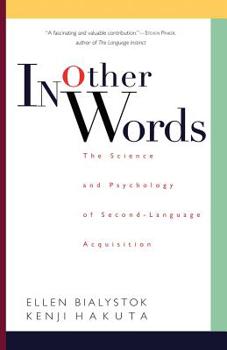In Other Words: The Science and Psychology of Second-Language Acquisition
Select Format
Select Condition 
Book Overview
More than five thousand languages are currently spoken around the globe. Learning to speak one of them is virtually effortless for most of us, so why is it commonly so difficult to learn a second... This description may be from another edition of this product.
Format:Paperback
Language:English
ISBN:0465032818
ISBN13:9780465032815
Release Date:October 1995
Publisher:Basic Books
Length:256 Pages
Weight:0.75 lbs.
Dimensions:0.6" x 5.4" x 8.7"
Customer Reviews
3 ratings
Good book for ESL teachers
Published by Thriftbooks.com User , 14 years ago
In Other Words: The Science and Psychology of Second Language Acquisition was written by Ellen Bialystok and Kenji Hakuta and published by Basic Books in 1994. The book provides a complete theoretical review on the development of second language learning and teaching. The authors discuss why it is easier for some and more difficult for others to learn another language. They organize the book based on five factors that they consider will make up the frame of second-language learning. These factors are language, brain, mind, self, and culture and are innate in those learning a second language. The authors explain how experiences may differ for every one and that the significance of a second language may depend on who is acquiring/learning the second language and what second language is being learned. The author's closing arguments are very optimistic for those who are in the process of learning a second language and those who have failed in the past and wish to give learning a second language another try. In page 206 of their book, Bialystok and Hakuta state, "There are no absolute barriers to second-language acquisition", thus, they encourage educators to consider using a variety of teaching technique to fulfill the needs and desires of the learners because no single correct approach is sufficient by itself to achieve language proficiency. The book covers a lot of material in a small space, is well written, interesting - and even entertaining. It provides a needed background for beginning language teachers and tutors at all levels. Criticisms It focuses too narrowly on oral/aural learning. It pays lip service to learning to read/write in a phonemic language but has nothing to say about ideographic languages (pictographic and logographic). There is a major deficiency in its oral/aural section - it only touches on poetry and song - and tonal languages. It does not say anything about people with various kinds of hearing deficiencies such as the inability to hear some tones within the normal hearing range. In summary, I recommend the book be considered for background reading in education courses directed to language teachers and teaching, specially to those teacher who have second-language learners in their classrooms.
a good review of the research--if you can understand it
Published by Thriftbooks.com User , 19 years ago
Just two criticisms: 1. The authors are not always objective. They belittle writings which other people might find valuable. A student of the Japanese language might profit from Ueda's list of 16 ways to avoid saying no. In 1954, McCarthy arrived at statistics regarding how many words are known by the average child at each age. A student learning a foreign vocabulary might be motivated by reading these statistics and competing with children of a particular age. Both of these writings are denounced by Bialystok & Hakuta. 2. Most of the sentences are complex and abstract: "It is our opinion that an integrated view that assembles components from various disparate sources in both theory and practice, which annotates those sourses with an analysis of their relevant and irrelevant features and then attempts to piece them together in a complex pattern, is precisely what practitioners need in order to allow them the freedom to interpret those patterns for their own purposes and from their own point of view." If you are a good enough reader to understand that, be my guest.
"In Other Words"
Published by Thriftbooks.com User , 24 years ago
"In Other Words" Stanford language researchers Bialystok and Hakuta provide a detailed overview of current research in primary and second language learning. Chapters focusing on the relevance of brain, mind, self, and culture in language learning and the implications of each for acquiring a second language are supported by critical evaluations of research and theory. This is a smorgassbord of tasty ideas for anyone interested in linguistics, language, and the human mind. As a graduate student in Education, I appreciated the breadth of research and ideas represented in only 219 pages. A terrific overview of issues in the academic arena of language and literacy.





